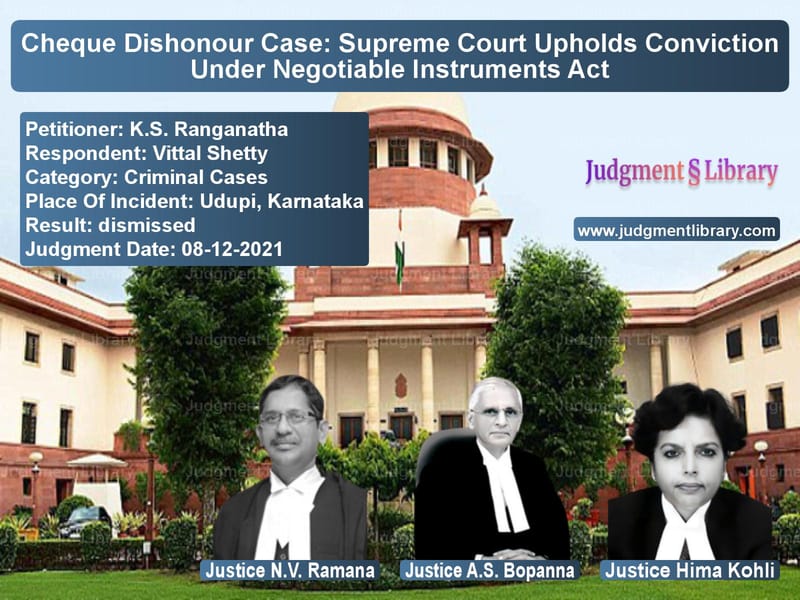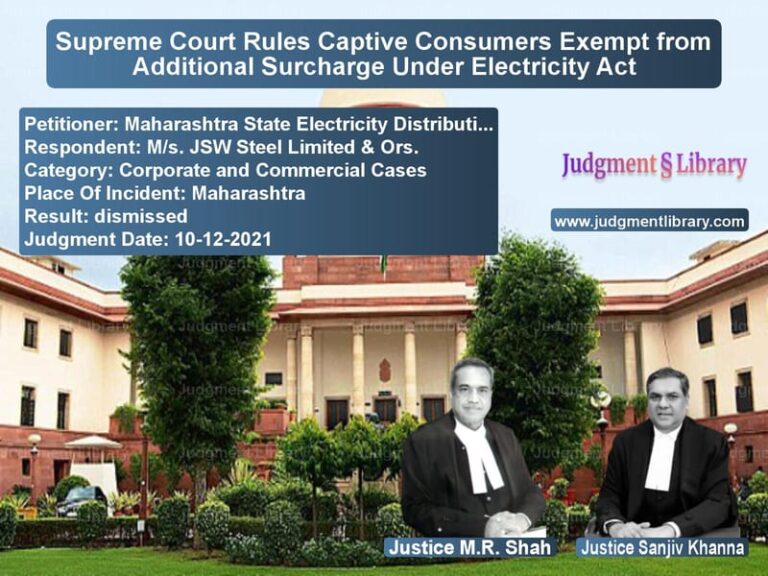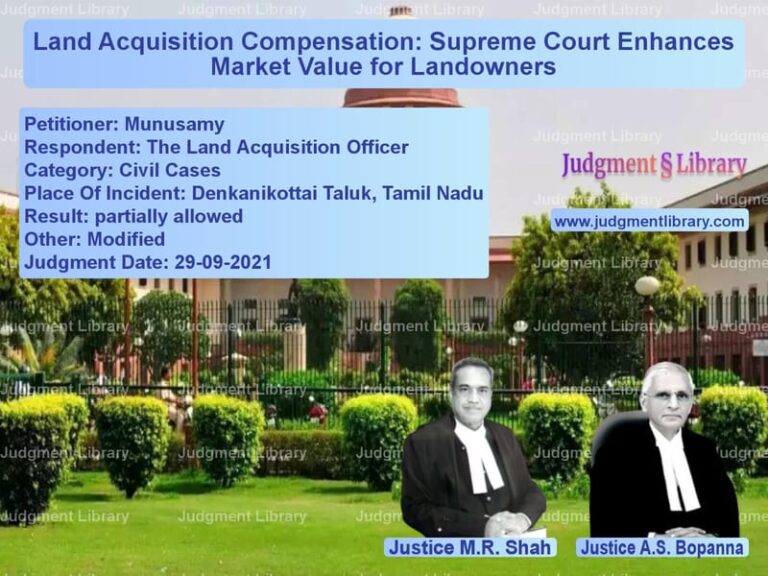Cheque Dishonour Case: Supreme Court Upholds Conviction Under Negotiable Instruments Act
The case of K.S. Ranganatha vs. Vittal Shetty was a crucial one in interpreting the provisions of the Negotiable Instruments Act, 1881, particularly regarding cheque dishonour under Section 138. This case involved a financial dispute where a cheque issued by the appellant, K.S. Ranganatha, was dishonoured due to insufficient funds, leading to criminal proceedings. The Supreme Court, through its judgment, upheld the conviction of the appellant and set key precedents in cheque bounce cases.
Background of the Case
The dispute originated when the respondent, Vittal Shetty, filed a complaint under Section 138 of the Negotiable Instruments Act (NI Act) after a cheque issued by K.S. Ranganatha bounced due to insufficient funds. The respondent alleged that the appellant had borrowed a sum of Rs. 3,75,000 on 12.06.2003, and to settle the debt, the appellant issued a post-dated cheque of Rs. 4,00,000, which included interest. The cheque was drawn on Corporation Bank, Ambalpady Branch, Udupi.
Upon presenting the cheque for clearance on 17.02.2004, the respondent discovered that it had been dishonoured due to insufficient funds. Following the legal procedure, he issued a statutory notice on 18.02.2004 demanding payment, but the appellant failed to comply, leading to criminal proceedings under Section 138 of the NI Act.
Trial Court Verdict
The trial court ruled in favour of the appellant, accepting his defence that:
- He had already repaid an earlier debt of Rs. 80,000 with interest, amounting to Rs. 3,20,000, and owed no further amount.
- The cheque was forcibly taken from him along with his signatures on blank papers.
- He had filed a criminal complaint against the respondent for coercion and illegal means used to obtain the cheque.
Based on these arguments, the trial court acquitted the appellant.
High Court Verdict
The respondent challenged the trial court’s decision in the Karnataka High Court, which reversed the acquittal and convicted the appellant. The High Court held that:
- The cheque was voluntarily issued and not forcibly taken.
- The statutory presumption under Section 139 of the NI Act that a cheque is issued for the discharge of a legally enforceable debt was not rebutted.
- The appellant’s claim that the cheque was misused was not supported by concrete evidence.
The High Court sentenced the appellant to pay Rs. 4,00,000 as compensation within four months, failing which he would face six months of simple imprisonment. Additionally, a fine of Rs. 5,000 was imposed, and in default, the appellant would undergo 15 days of simple imprisonment.
Supreme Court’s Key Observations
The Supreme Court examined the legal aspects of the case, particularly focusing on the presumption under Section 139 of the NI Act. The Court made the following key observations:
1. Presumption Under Section 139
The Court reiterated the principle that once the execution of a cheque is admitted, the presumption under Section 139 applies:
“Once the execution of a cheque is admitted, the presumption under Section 118(a) would arise that it is supported by consideration. Such a presumption is rebuttable, but the burden is on the accused to prove otherwise.”
It emphasized that the accused cannot simply deny the existence of a legally enforceable debt; they must provide substantial evidence to rebut the presumption.
2. The Standard of Proof for Rebutting Presumption
The Court clarified that the burden of proof on the accused is not as high as in criminal cases. The accused needs to establish a probable defence based on the preponderance of probabilities, not beyond reasonable doubt.
“The standard of proof required to rebut the presumption is preponderance of probabilities and not proof beyond reasonable doubt.”
The appellant failed to provide credible evidence that the cheque was taken by force or that there was no outstanding liability.
3. The Relevance of Prior Transactions
The appellant admitted that he had financial transactions with the respondent in the past. The Court held that this made it more plausible that the cheque was issued for a legally enforceable debt rather than being a blank cheque misused by the respondent.
4. Dismissal of the Appellant’s Complaint Against the Respondent
The appellant had filed a complaint alleging that the respondent had forcefully taken his cheque and signatures. However, the trial court had already acquitted the respondent in those proceedings. The Supreme Court noted:
“The jurisdictional Court had examined the allegations of coercion and dismissed them. Another court cannot brush aside this finding lightly.”
Since the criminal complaint against the respondent was dismissed, the argument that the cheque was forcibly obtained was no longer tenable.
Supreme Court’s Verdict
After reviewing the evidence and legal principles, the Supreme Court upheld the High Court’s conviction of the appellant under Section 138 of the NI Act. The Court ruled:
- The cheque was issued voluntarily and was meant to discharge a legally enforceable debt.
- The presumption under Section 139 was not effectively rebutted by the appellant.
- The High Court’s judgment was legally sound and did not require interference.
The Supreme Court dismissed the appeal and directed the appellant to comply with the High Court’s order of compensation and fine.
Implications of the Judgment
This ruling has significant implications for cheque bounce cases in India:
- Strengthening the NI Act: The judgment reinforces that once a cheque is issued, the legal presumption of debt exists unless the accused can prove otherwise.
- Reducing Frivolous Defences: Accused individuals can no longer rely on mere allegations of coercion or misuse without substantial proof.
- Ensuring Fairness in Financial Transactions: The judgment provides security to creditors and discourages dishonesty in financial dealings.
The Supreme Court’s decision in this case sets a strong precedent for cheque dishonour cases, ensuring that financial obligations are met and the credibility of negotiable instruments is upheld.
Petitioner Name: K.S. Ranganatha.Respondent Name: Vittal Shetty.Judgment By: Justice N.V. Ramana, Justice A.S. Bopanna, Justice Hima Kohli.Place Of Incident: Udupi, Karnataka.Judgment Date: 08-12-2021.
Don’t miss out on the full details! Download the complete judgment in PDF format below and gain valuable insights instantly!
Download Judgment: k.s.-ranganatha-vs-vittal-shetty-supreme-court-of-india-judgment-dated-08-12-2021.pdf
Directly Download Judgment: Directly download this Judgment
See all petitions in Fraud and Forgery
See all petitions in Cheque Dishonour Cases
See all petitions in Debt Recovery
See all petitions in Judgment by N.V. Ramana
See all petitions in Judgment by A. S. Bopanna
See all petitions in Judgment by Hima Kohli
See all petitions in dismissed
See all petitions in supreme court of India judgments December 2021
See all petitions in 2021 judgments
See all posts in Criminal Cases Category
See all allowed petitions in Criminal Cases Category
See all Dismissed petitions in Criminal Cases Category
See all partially allowed petitions in Criminal Cases Category







